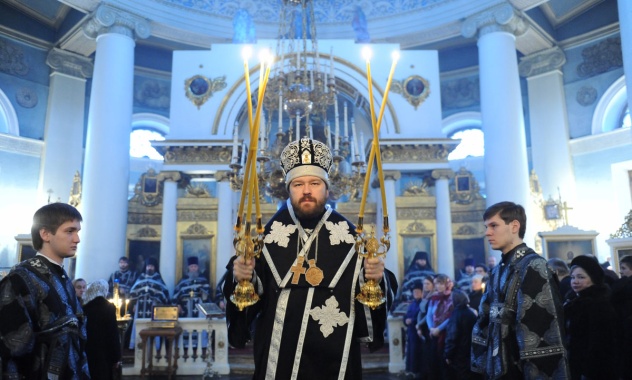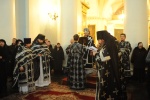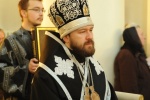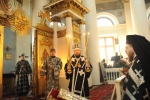Metropolitan Hilarion of Volokolamsk: Lent is a time to look into oneself
On February 29, 2012, the Wednesday of the first Lenten week, Metropolitan Hilarion of Volokolamsk, head of the Moscow Patriarchate’s department for external church relations, celebrated the Liturgy of the Pre-sanctified Gifts at the church of Our Lady the Joy of All the Afflicted in Moscow.
After the service, His Eminence addressed the congregation with the following homily:
‘Today we have celebrated a special Lenten liturgy without the sacrament of the Eucharist, for it is the Liturgy of the Pre-sanctified Gift. During this liturgy we partake of the Holy Gifts which were already sanctified during the previous full liturgy, and all the prayers of this service are about the worship of the Lord Jesus Christ who is with us in his Holy Gifts. And these prayers also speak of the spiritual feat, the feat of purification of our souls in the Lenten days.
We have embarked on the pursuits of the Holy Forty Weeks, and we hear at each service in these fasting days the words of St. Ephraim the Syrian in his prayer: ‘O Lord, grant me to see my own errors and not to judge my brother’. Why is it so important for us to see our own sins? It seems it would be much easier for us to live without noticing our sins or our shortcomings. Indeed, the awareness of them becomes for us a source of sorrow, anxiety, perplexity and dissatisfaction while the modern world and the entire modern culture make us feel perfectly satisfied with ourselves and wish that our desires may be fulfilled as far as possible.
Then isn’t it easier for us to live without noticing our sins? A sin is an illness. There are those who prefer to ignore their illnesses, but we know only too well that if one does not have one’s diagnosis made correctly, it is impossible to choose the necessary treatment. If one does not come to a doctor then the diagnosis will not be made and a treatment will not be chosen. Similar laws exist in the spiritual life: spiritual illnesses must be treated. But if one assures oneself and those around him that he is not ill, he can find comfort in this idea only for a while until the illness takes roots deeply in his organism, until the symptoms declare themselves and begin to disturb his life. Only then he begins to think about sin.
Man does not see his sins fully because the Lord spares him. As one of the holy fathers said, if we could see all our sins we would be terrified by their multitude and would give way to despair. It is for this reason that the Lord opens our eyes only to some of our sins and only partially at that. But if we continually turn to God with this prayer, if we make confession, then the Lord leads us on the way of self-awareness and helps us to eradicate our limitations one by one. Sometimes the Lord opens our eye to a certain aspect of our life, a particular shortcoming, which we did not notice before, helping us in this way to become purer.
Undertaking the pursuits of Lent, we should think over our sins, not the sins of others, as is often the case with confessors who come to their priest to tell him about the shortcomings of their neighbours. Lent helps us to look into the depths of our own souls and to be terrified by the multitude of our sins without falling into despair in the awareness that where there is an illness there is a doctor and a treatment. Where there is sin there is the remedy of repentance and Holy Communion, which heals us from every spiritual infirmity and illness.
The Lenten time is a time for repentance. The Lord gives us these days every year for us, first of all, to look into ourselves and turn to the Almighty with prayers for his help in our spiritual life, for us to see our sins and illnesses so that we may seek the doctor and healing, so that we may ask the Lord himself to be our doctor and healer of our souls and bodies. Amen’.
DECR Communication Service


































